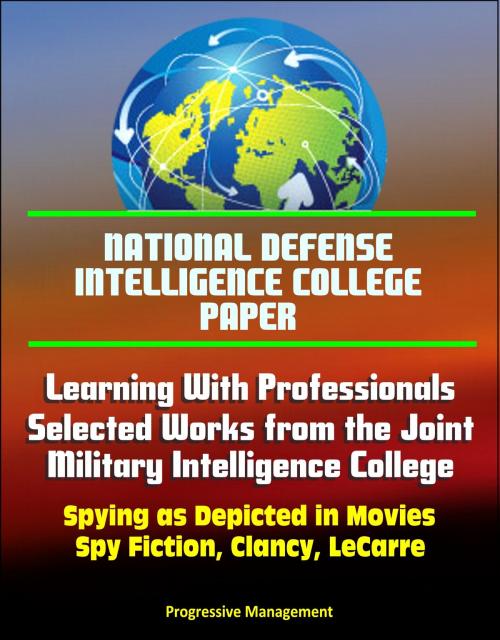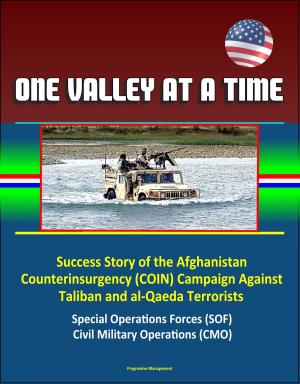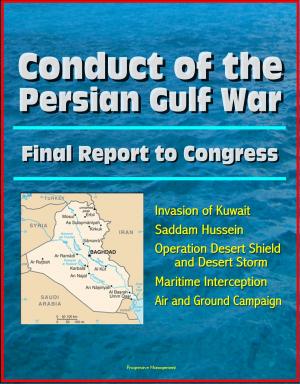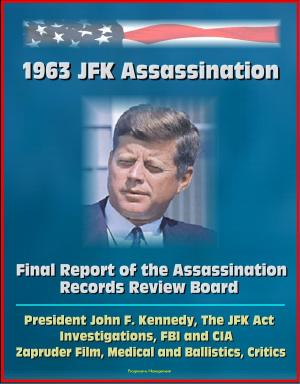National Defense Intelligence College Paper: Learning With Professionals - Selected Works from the Joint Military Intelligence College - Spying as Depicted in Movies, Spy Fiction, Clancy, LeCarre
Nonfiction, History, Military, Strategy, Social & Cultural Studies, Political Science| Author: | Progressive Management | ISBN: | 9781310712388 |
| Publisher: | Progressive Management | Publication: | December 5, 2013 |
| Imprint: | Smashwords Edition | Language: | English |
| Author: | Progressive Management |
| ISBN: | 9781310712388 |
| Publisher: | Progressive Management |
| Publication: | December 5, 2013 |
| Imprint: | Smashwords Edition |
| Language: | English |
This unique and informative paper was produced by the National Intelligence University / National Defense Intelligence College. Topics and subjects include: spying as depicted in movies and novels, spy fiction vs. spy reality, history of intelligence, John LeCarre, Tom Clancy, Robert Ludlum, Principles of Intelligence, accuracy, objectivity, usability, relevance, readiness, timeliness, Cuban missile crisis, John F. Kennedy, Robert F. Kennedy, San Cristobal Trapezoid, aerial reconnaissance, Israeli recon satellite program, 1973 Yom Kippur war, Case Method, Rwanda, Tutsi and Hutu, NIMA, applications of intelligence, health and national security, intelligence support to refugee operations, religion and war in the 21st century, bioterror, narcotrafficking.
If intelligence was first formally declared an instrument of U.S. national security in the National Security Act of 1947, it did not enter the mainstream of American thinking and discourse until the terrorist attacks of 2001 and their aftermath. Now, with the benefit of commission studies and recommendations and executive and legislative actions culminating in the passage of the Intelligence Reform and Terrorism Prevention Act of 2004, good, timely, relevant intelligence is recognized as "the air the nation breathes." Soccer moms discuss intelligence. College students' interest in intelligence extends beyond the work of the classroom to the prospect of intelligence as a career.
The Joint Military Intelligence College has the privilege and the trust of serving as the Federal Government's center of excellence for intelligence education and research. With teaching and research at both the classified and unclassified levels, the College awards the Master of Science of Strategic Intelligence degree and the Bachelor of Science in Intelligence degree. The College's degrees are authorized by the Congress. The College is accredited by the Middle States Commission on Higher Education and is a member of the Consortium of Universities of the Washington Metropolitan Area.
The research and publications of the College's students, faculty, and research fellows are contributing to the work of intelligence and the security of the nation. They are creating the literature of intelligence. This book of readings taken from such research and writings offers a window on the incredible history and evolving work of intelligence and the contributions it is making in the early 21st century. The different chapters underscore the importance of the emergence of intelligence as a sought-after academic discipline.
The Work of Intelligence * Meeting the Intelligence Community's Continuing Need for an Intelligence Literature * The Basic Tools of Writing with Intelligence * Intelligence Essentials for Everyone, Prologue, Part 1, Part 2 * On Becoming an Intelligence Analyst * Getting Intelligence Right: The Power of Logical Procedure * Opening Windows of Opportunity: The Need for Opportunities-Based Warning * Teaching Vision. * Spy Fiction, Spy Reality * Evidence Marshaling and Argument Construction * Failures of Imagination: Thoughts on the 9/11 Commission Report * Homeland Security and Intelligence: Can Oil Mix with Water in an Open Society? * The History of Intelligence * The San Cristobal Trapezoid * Israel's Quest for Satellite Intelligence * Experiences to Go: Teaching with Intelligence Case Studies * The Creation of the National Imagery and Mapping Agency: Congress's Role as Overseer * The Applications of Intelligence * Health and National Security * Intelligence Support to Refugee Operations: Who's the Expert? * Religion and War in the 21st Century * Intelligence Support to the Life Science Community: Mitigating Threats from Bioterrorism * 'SALSA for Cyber Sonics': Education and Research at the Joint Military Intelligence College * Knowledge-based Tools: A Solution for Optimizing Collection Requirements Management * Narco-Mercantilism and the War on Drugs
This unique and informative paper was produced by the National Intelligence University / National Defense Intelligence College. Topics and subjects include: spying as depicted in movies and novels, spy fiction vs. spy reality, history of intelligence, John LeCarre, Tom Clancy, Robert Ludlum, Principles of Intelligence, accuracy, objectivity, usability, relevance, readiness, timeliness, Cuban missile crisis, John F. Kennedy, Robert F. Kennedy, San Cristobal Trapezoid, aerial reconnaissance, Israeli recon satellite program, 1973 Yom Kippur war, Case Method, Rwanda, Tutsi and Hutu, NIMA, applications of intelligence, health and national security, intelligence support to refugee operations, religion and war in the 21st century, bioterror, narcotrafficking.
If intelligence was first formally declared an instrument of U.S. national security in the National Security Act of 1947, it did not enter the mainstream of American thinking and discourse until the terrorist attacks of 2001 and their aftermath. Now, with the benefit of commission studies and recommendations and executive and legislative actions culminating in the passage of the Intelligence Reform and Terrorism Prevention Act of 2004, good, timely, relevant intelligence is recognized as "the air the nation breathes." Soccer moms discuss intelligence. College students' interest in intelligence extends beyond the work of the classroom to the prospect of intelligence as a career.
The Joint Military Intelligence College has the privilege and the trust of serving as the Federal Government's center of excellence for intelligence education and research. With teaching and research at both the classified and unclassified levels, the College awards the Master of Science of Strategic Intelligence degree and the Bachelor of Science in Intelligence degree. The College's degrees are authorized by the Congress. The College is accredited by the Middle States Commission on Higher Education and is a member of the Consortium of Universities of the Washington Metropolitan Area.
The research and publications of the College's students, faculty, and research fellows are contributing to the work of intelligence and the security of the nation. They are creating the literature of intelligence. This book of readings taken from such research and writings offers a window on the incredible history and evolving work of intelligence and the contributions it is making in the early 21st century. The different chapters underscore the importance of the emergence of intelligence as a sought-after academic discipline.
The Work of Intelligence * Meeting the Intelligence Community's Continuing Need for an Intelligence Literature * The Basic Tools of Writing with Intelligence * Intelligence Essentials for Everyone, Prologue, Part 1, Part 2 * On Becoming an Intelligence Analyst * Getting Intelligence Right: The Power of Logical Procedure * Opening Windows of Opportunity: The Need for Opportunities-Based Warning * Teaching Vision. * Spy Fiction, Spy Reality * Evidence Marshaling and Argument Construction * Failures of Imagination: Thoughts on the 9/11 Commission Report * Homeland Security and Intelligence: Can Oil Mix with Water in an Open Society? * The History of Intelligence * The San Cristobal Trapezoid * Israel's Quest for Satellite Intelligence * Experiences to Go: Teaching with Intelligence Case Studies * The Creation of the National Imagery and Mapping Agency: Congress's Role as Overseer * The Applications of Intelligence * Health and National Security * Intelligence Support to Refugee Operations: Who's the Expert? * Religion and War in the 21st Century * Intelligence Support to the Life Science Community: Mitigating Threats from Bioterrorism * 'SALSA for Cyber Sonics': Education and Research at the Joint Military Intelligence College * Knowledge-based Tools: A Solution for Optimizing Collection Requirements Management * Narco-Mercantilism and the War on Drugs















